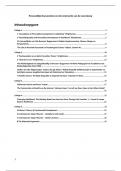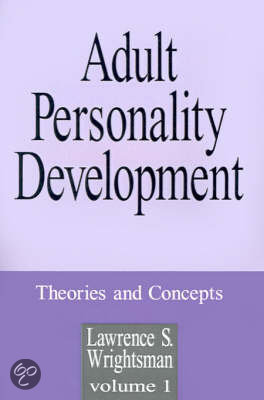Persoonlijke Documenten en de Constructie van de Levensloop
Inhoudsopgave
College 1........................................................................................................................................................ 2
1 ‘Conceptions of Personality Development in Adulthood’ Wrightsman......................................................2
5 ‘Psychobiography and Personality Development in Adulthood’ Wrightsman...........................................5
‘De Gevaarlijkste van Alle Bronnen’ Baggerman & Dekker Egodocumenten: Nieuwe Wegen en
Perspectieven............................................................................................................................................ 8
‘The Use of Personal Documents in Psychological Science’ Allport, Gordon W.............................................9
College 2...................................................................................................................................................... 10
2 ‘Psychoanalysis as an Early Formation Theory’ Wrightsman..................................................................10
3 ‘Theorist’s Lives’ Wrightsman............................................................................................................... 13
‘Het Kinderdagboek als Spiegelbeeldig Universum’ Baggerman Verlichte Pedagogiek en de Opkomst van
Kinderdagboeken Rond 1800................................................................................................................... 14
‘Anders als mijn Tijdgenootjes, Anders dan gij Alleen?’ Röling Kinderlijk Zelfbewustzijn in negentiende- en
twintigste-eeuwse Jeugdherinneringen uit Nederland en Vlaanderen......................................................15
‘A Familiy Science: The Baby Biography in Imperial Germany’ Amanda M. Brian......................................16
College 3...................................................................................................................................................... 17
‘Adolescent Strom and Stress’ Arnett....................................................................................................... 17
‘The Construction of Identity on the Internet’ Moinian Oops! I’ve Left my Diary Open to the Whole World!
............................................................................................................................................................... 19
College 4...................................................................................................................................................... 21
‘Emerging Adulthood: The Winding Road from the Late Teens Through the Twenties’ J. J. Arnett A Longer
Road to Adulthood.................................................................................................................................. 21
College 5...................................................................................................................................................... 23
4 Erikson’s Theory of Psychosocial Development......................................................................................23
6 Contemporary Stage Theories – Havighurst and Gould..........................................................................27
7 Contemporary Stage Theories – Daniel Levinson...................................................................................30
8 The Dialectical Approach...................................................................................................................... 33
1
,College 1
1 ‘Conceptions of Personality Development in Adulthood’ Wrightsman
- Thirty years ago, the assumption held by most psychologists, as well as b society in general,
was that once people passed through the traumas of adolescence, completed their formal
schooling, entered the world of work, got married, and ‘settled down’, nothing much new
happened to the until the inevitability of their death.
- Three broad theoretical perspectives provide highly contrasting answers to some questions.
These are:
1. An early formation approach that assumes personality structure is established – and then
remains essentially unchanged – in the first years of childhood.
2. A stage theory of development, as represented in the concepts of Erik Erikson, Daniel
Levinson, and Roger Gould.
3. A dialectical analysis that poses ongoing irreconcilable tensions between basic needs,
meaning that development never ends.
- By ‘personal documents’ we refer to materials such as autobiographies, memoirs, diaries, and
collections of letters.
- My focus is on the global nature of personality, as defined in a classis Allportian sense
(Allport, 1937). This personality paradigm, as described by Craik (1976), uses the person as
the basis unit of analysis, seeks to understand the organization of the individual’s behavior,
and investigates the relationship of the individual’s personality characteristics to. His or her
behavior and outcomes
Early Formation Theories
- An extreme reflection of the view: ‘as the twig is bent the tree is formed,’ proposes that you
now are what you were, only bigger and more; whatever occurs later is just an elaboration or
refinement of an early orientation.
- Personal Construct Theory
o Early formation theories are usually associated with a psychoanalytic explanation of
personality development.
o Cognitive analyses of personality development also may emphasize early
developmental processes.
o Our behavior is influenced by our perceptions. We react to what we think we see or
hear, not just what is actually there. Given the same stimulus – the same painting,
the same song – each of us is likely to perceive it as somewhat different.
In personal construct theory, interpretation thus results from cognitive
determinants (in contrast to psychoanalytic theory, which emphasizes
motivations).
o Interpretation is inventible, because the world is too complex to be perceived
straightforwardly. There is too much going on to process everything; we can notice
this, but not that.
o We also have to make decisions rapidly on occasion, forcing us not only to perceive
but to interpret.
o George Kelly (1955) developed personal construct theory as an effort to systematize
these assumptions.
This approach reflects, in a broad way, current thinking about cognitive
development in young children.
o Kelly proposed that our assessment of individual people is based on the distinctive
collection of constructs each of us has in our repertoire.
o Central to Kelly’s conception of human nature is the proposal that each of us is like a
scientist, constantly developing, testing, and revising our constructs as we seek to
predict and understand (and sometimes control) the behavior of important people in
our lives.
2
, o Kelly developed an instrument to identify the constructs each of us uses; the Role
Construct Repertory Test (REP Test) is different form traditional personality
inventories because the subjects, rather than the test constructor, generate the test’s
basic dimensions.
o Kelly rejected revered psychoanalytic concepts, such as unconscious, drives, and
emotion.
o So, does Kelly fit as an early-formation theorist? Yes and no…
Yes, in the sense that one of his messages is that some simplification is a
necessity; he wrote that without the creation of constructs, the world would
appear to be an ‘undifferentiated homogeneity’. And once we form
constructs, they have a tendency to become so internalized and self-
perpetuating that we are not even aware that we are using them to generate
decisions about behaving toward others.
No, because he believed that people can create alternative explanations of
their world.
- Psychoanalytic Theory
o Classic psychoanalytic theory, despite all its modifications, assumes that personality is
largely formed during the first 5 years of life. The structure that is established then
influences behavior for the rest of life.
o If fixations occur at these tender ages, they have ramifications on our behavior as
adults.
- The Life Script Approach
o Probably the most extreme variant of a psychoanalytic approach, formulated by Eric
Berne, Claude Steiner, and other transactional analysts.
o A life script presupposes that the young child embraces a consistent orientation to
others and to the social environment that is relentlessly ‘played out’ throughout the
rest of childhood, adolescence, and adulthood.
o Eric Berne defined a life script as a complex set of transactions by nature recurrent
but not necessarily recurring, because a complete performance of a script may
require a whole lifetime.
Yet the life script is assumed to be formed within the first 5 years of life.
For Berne, and other life script theorists, a script results form a repetition
compulsion, or the tendency to repeat unhappy childhood events.
o Absolutely fundamental to life script theory is this assumption that people develop a
characteristic interpersonal strategy in childhood, and that this strategy inexorably
influences and makes understandable their interactions with others for the rest of
their lives.
o Berne hypothesized that each of us battles between the nature of our script and the
wish to avoid a personal disaster.
o Autobiographies and other personal document reflect an explicit link between the
person’s own characteristic style as an adult and a significant experience that person
had as child, usually involving an interaction with a parent.
o To summarize the life script conception, development is seen as playing only a limited
role, because the content and structure of orientations toward others are formed
early in life. Although the dominant script can be changed (through the therapeutic
benefits of transactional analysis, of course!), Berne believed that some kind of
intervention like this was required for the change to happen.
o Tomkin’s Script Theory
Tomkin’s conception of a script does not rely as much on heavy handed
processes as Berne’s does; in Tomkin’s conception the person is like a
3
, playwright constructing a dramatic narrative in order to make sense of his or
her life. But like Berne’s script theory, for Tomkins it is initiated in the earliest
weeks of life.
The most basic unit of analysis in Tomkin’s theory is the scene: ‘an idealized,
affect-laden ‘happening’ that is constructed (rather than passively
experienced and objectively recorded [in Berne’s theory]).
Stage Theories of Adult Development
- Erik Erikson (1959) gave impetus to a stage-oriented explanation that extended development
throughout the life span by building on Freud's theory of psychosexual development and by
generating a theory of eight stages of development.
- According to Erikson, then, personality development proceeds by ‘critical steps – critical being
a characteristic of turning points, of moments of decision between progress and regression,
integration and retardation.’
- Erikson’s approach reflects at least three major differences from the early formation
viewpoint reflected by life script theory:
1. The mold is formed less concretely in childhood, although certainly all future
development is affected by the way that the initial trust-versus-mistrust conflict is
resolved.
2. Stage theories propose tasks that we feel pressured to do at various ages.
3. Erikson acknowledges that the determinants of personality development extend beyond
biological and family ones; the nature of society and its institutions are intrinsically
intertwined with the stages of development.
- But what is common to these two conceptualizations is important:
o Erikson’s writings can be interpreted as saying that the conflict or dilemma at each
stage must be settled in one way or another before consideration of the task at the
next stage – and, ideally, growth – can occur. This emphasis on resolution or closure
seems to share the life script approach’s assumption that the person develops a
blueprint by which conflict is thwarted.
- The social interactionist perspective would question, for example, whether stages are
anything more than expectations for what should be our concerns at a given age.
- According to Weick’s growth task model, adults constantly redefine and rework tasks, for
example, nurturance and productivity.
Dialectical Approach to Personality Development
- Applications of a dialectical analysis to personality have been rather infrequent, but Irwin
Altman and his colleagues have developed a dialectical analysis of interpersonal
relationships.
- The following assumptions are basic to this approach:
1. Personality can be described as a collection of pairs of characteristics struggling for control within
the individual.
2. Personality development reflects a striving toward the satisfaction or achievement of each of
these forces, independently (perhaps even at the same time).
3. These characteristics that are in opposition do not simply reflect a presence versus an absence,
but rather each is an entity that has a quality of its own; the tug is between two different poles
representing, for example, affiliation and privacy, rather than a presence/absence state of being
hungry or not hungry.
4. These contending characteristics are always in a state of tension; their relationship is cyclical and
changing rather than stable. No matter how strong the pull from one motive or need ad a given
moment, some amount of the other oppositional force still exists and exerts an influence; thus –
and perhaps this is the most important credo of the dialectical approach – the characteristic
nature of the system is a never-ending struggle.
5. In a dialectical analysis, a concept of balance or homeostasis is of no permanent value, because it
is the nature of behavior always to be changing. In contrast to the two previous approaches that
assume the resolution of a conflict, a dialectical analysis would propose that the whole idea
4






